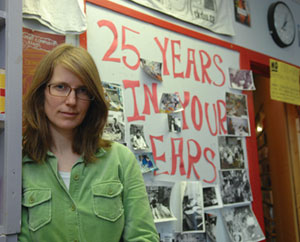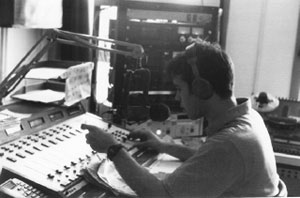 |
| Erica Butler is the station┬аcoordinator at CKDU.(Danny Abriel Photo) |
H┬■╗н-based CKDU 88.1 FM celebrates a quarter century on FM radio this month, marking 25 years as a source alternative music, news, current affairs and diverse language media in Halifax.
When CKDU went on the air in 1985, it was crucial link for Haligonians in the pre-Internet age to news, music, culture and information that couldnтАЩt be found elsewhere in broadcast media. Yet, in 2010 CKDU still sees its role in a multi-media, fragmented content-rich world as very much the same, albeit while using more tools than an FM transmitter to get the message out.
тАЬThe Internet didnтАЩt exist in 1985,тАЭ says Erica Butler, station coordinator at CKDU. тАЬ(The station) was more necessary and had greater impact. I heard about people tuning in to access any kind of musicтАФpunk rock, house, local artistsтАФit was something you couldnтАЩt get anywhere else.тАЭ
Sometimes getting CKDU at all wasnтАЩt very easy. CKDU was broadcast at approximately 30 wattsтАФтАЬless power but more fun than your average light bulb,тАЭ as its on-air promos used to sayтАФwhich was miniscule compare to Q104, which broadcasts at 100,000 watts.
тАЬI remember hearing about Buck 65 (Richard Terfry, host of CBC Radio 2тАЩs Drive) adjusting his antenna in Mount Uniacke to try to get (CKDU) and all the music he couldnтАЩt get anywhere else,тАЭ says Ms. Butler. тАЬCampus/community radio across Canada was, and still is, a free and accessible window into alternative music and culture.тАЭ
CKDU broadcasts 24 hours a day, seven days a week on a shoestring budget of $180,000. It employs six part-time staff and has a volunteer base of more than 150 community members, Dal students and staff. Ms. Butler says that while the stationтАЩs hosts are diverse in their interests, they share a common passion for radio. тАЬThe technology brings them together.тАЭ
CKDUтАЩs eclectic programming ranges from Voice of Eritrea on Sunday afternoons; The Prole, a punk show, and Mad Sessions, reggae music, on Fridays, and Operation Wake Up, weekday mornings at 8 a.m. Over night, the programming keeps rolling, with shows like Global-a-Go-Go, Popped Culture, Halifax is Burning and the Maple Mothership.
The same community approach to media which launched the station in 1985 is alive and well today. тАЬItтАЩs an incubator where people were developing skills and values around media, community and getting info,тАЭ she says, noting that a number of former CKDUers have moved on to careers in media. тАЬOur alumni list is venerable, from Jane Kansas to Jane Farrow, Rich Terfry and many more.тАЭ
 |
| Graham MacDougall behind the mic, circa 1994. |
WhatтАЩs in store for CKDU in the next decades to come? Despite continued media fragmentation, Ms. Butler sees CKDUтАЩs role as continuing to be important to the local community. тАЬWe plan to keep the station as live as possible, with hosts from 8 a.m. to midnight,тАЭ she says.
While the technology of radio has brought a diverse group of people together to create a weekly program schedule, new technologies will continue to bring people who are interested in creating content together. тАЬCKDU is innovative in that it runs on open-source software. Everything we do is with open-source technology,тАЭ she says, noting that CKDUтАЩs mandate to cover local issues and provide a voice to alternative media remains the same. тАЬWe need to keep on top of technology ... give people in HRM the opportunity to hear what their neighbours are saying and promote ourselves better. Your media should not be a homogenous glob.тАЭ
Graham MacDougall is the associate director of Dal's web team. In a former life, he played space-age bachelor pad music on CKDU.┬а
LINKS:
тАв┬а
тАв┬а
тАв┬а┬а(launches iTunes or similar audio player on your computer)
